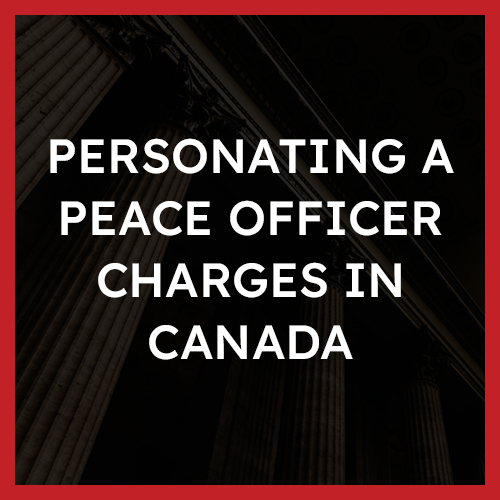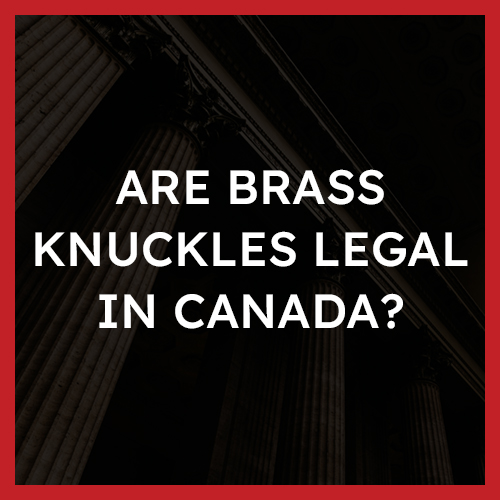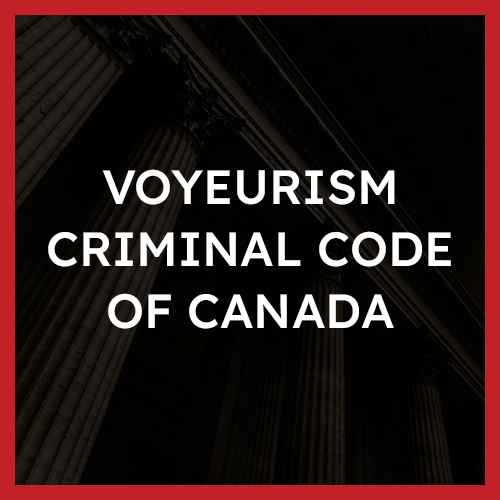Personating a Peace Officer Laws in Canada
What is a personating a peace officer charge?

A personating a peace officer charge occurs when a person falsely represents themselves as a peace or public officer when they are not one. A person can also be charged with this offence if they use a badge, article of clothing, or equipment in a manner that is likely to cause others to believe they are a peace or public officer. Peace and public officer are defined in s. 2 of the Criminal Code. A peace officer includes mayors, prison staff, wardens, justices of the peace, police officers, constables and bailiffs. A public officer includes Canadian Forces (military) officers, customs officers and RCMP officers.
Personating a peace officer is a hybrid offence with a Crown election. This means that depending on the circumstances of your case, the Crown can elect to proceed by indictment or summarily. If an accused is prosecuted by indictment, there is a Defence election of court under s. 536(2) of the Criminal Code.
Examples
Some examples of a personating a peace officer charge may include the following
- The accused showed a homeowner a fake police badge and informed them that they have a warrant to search their house;
- The accused pulled over an individual on the road with emergency red and blue lights when they are not a police or peace officer; and
- The accused falsely and deliberately identifies themselves as a police officer to a member of the public.
Defences
The defences available to a personating a peace officer charge is entirely dependent on the facts of your case.
However, some defences to a personating a peace officer charge may include:
- The accused never represented themselves to anyone as a peace officer;
- The accused had no intention to make others believe that they were a peace officer; and
- The accused was a peace officer at the time of the alleged offence.
Punishment
A personating a peace officer charge is a hybrid offence, which entails a maximum punishment as follows:
- Imprisonment for a term not exceeding 5 years.
Punishments for personating a peace officer depend on if the Crown elects to pursue the charge as an indictable offence or summarily. There are no mandatory minimum penalties for this offence. The maximum is no more than 5 years of incarceration if prosecuted by indictment. If prosecuted summarily, the maximum punishment is no more than 2 years less a day of incarceration and/or a $5,000 fine.
A personating a peace officer charge can also entail severe consequences for current and future employment opportunities and immigration status.
Overview of the Offence
According to s.130(1) of the Criminal Code:
Personating peace officer
130 (1) Everyone commits an offence who
- falsely represents himself to be a peace officer or a public officer; or
- not being a peace officer or public officer, uses a badge or article of uniform or equipment in a manner that is likely to cause persons to believe that he is a peace officer or a public officer, as the case may be.
The Guilty Act (Actus Reus)
The actus reus for a personating a peace officer conviction under s.130(1) of the Criminal Code is established by proof, beyond a reasonable doubt, of the following:
- The deliberate act of a person falsely representing themselves as a peace officer.
R. v. Palinker found that the accused represented themselves as a peace officer when he remarked that he was an undercover police officer, and flashed his wallet at a victim.
R. v. Vollrath found that the accused represented themselves a peace officer when they showed up to a victim’s home in police gear, said they were from the Edmonton Police, and placed handcuffs on the victim.
The Guilty Mind (Mens Rea)
The mens rea for a personating a peace officer conviction under s.130(1) of the Criminal Code is established by proof, beyond a reasonable doubt, that
- The accused had the intent to falsely represent themselves as a peace officer.
In R. v. Palinker, the court held there is no requirement that the person to whom the representation was made actually believed that person was a peace officer. The mens rea component of this offence only asks whether the accused intended to falsely represent themselves as a peace officer.
Defences
How to Beat a Personating a Peace Officer Charge
Every case is different. The availability and strength of any defence depend entirely on the specific facts of your case. The strength of any available defence rests on the evidence against you and the precise details of the allegations. Regarding this specific charge, it may also be important to determine the occupation of the accused.
However, the following are some possible defences that may be used when fighting a personating a peace officer charge:
Factual Innocence
A strong defence against a personating a peace officer charge is to maintain that you are factually innocent. If you can show that the facts and evidence do not support that you represented yourself as a peace officer to another person, then you may have a defence that you were factually innocent.
No Attempt to Deceive
If you can show that you dressed up as a police officer for a particular purpose that does not involve making others believe you are a peace officer, then you can be found not guilty of the offence. If you dressed up as a police officer for Halloween and did not intend to make people believe you were an actual police officer, it may be the case you did not commit the offence.
The Accused is a Peace Officer
A strong defence to a personating a peace officer charge is that you were a peace officer at the time of the alleged offence.
In R. v Kovlaske, the court held that personating a peace officer requires the Crown to prove that the accused must not be a peace officer, as opposed to it being simply unclear. It may therefore be the case that you have a defence to personating a peace officer charge if it is possible you were a peace officer at the time of the offence.
Identity
Depending on the circumstances of your case, a possible defence to personating a peace officer charge may be to raise an identity defence. In this case, for this defence to be raised successfully, you will have to prove that you were not the person who falsely represented themselves as a peace officer to a member of the public.
Any Applicable Charter Defences
The Charter sets out your rights and freedoms before and after your arrest. any of your Charter rights have been violated before or after your arrest, you may be able to have some or all of the evidence that the Crown is relying on to secure a conviction excluded under s. 24(2) of the Charter.
Punishments
The Criminal Code provides for a possible maximum term of imprisonment of no more than 5 years for those convicted of a personating a peace officer charge.
Persons found guilty of personating a peace officer are eligible for sentencing entailing a discharge, suspended sentence, stand-alone fine, custody, custody with a fine or probation or a conditional sentence order.
Beyond any immediate jail and/or probation sentence you receive, there are also discretionary DNA Orders and Weapons Prohibition Orders.
This is authorized as a secondary offence listed under s. 487.04 (c), (d) or (e), and the DNA order can be authorized regardless of if the Crown proceeds summarily or by indictment.
Section 130 of the Criminal Code outlines that where a court finds that an accused convicted of personating a peace officer did so for the purposes of facilitating another crime, it will be considered an aggravating circumstance in sentencing.
Frequently Asked Questions
What does personating a peace officer mean?
Personating a peace officer may be committed by a person who falsely represents themselves as a peace or public officer, or by someone who uses their badge or other equipment in a manner that is likely to cause others to believe that they are such an officer.
Is personating a peace officer an indictable offence?
Personating a peace officer is a hybrid offence. This means that the Crown prosecutor can choose to prosecute someone charged with personating a peace officer either summarily or by indictment. If the Crown chooses to prosecute an accused by indictment, then if the accused is found guilty, they will be charged with an indictable offence.
Can you go to jail for impersonating a police officer?
If you are convicted for personating a peace officer under section 130(1), you can go to jail. If the Crown proceeds by indictment, a personating a peace officer charge carries a maximum sentence of no more than five years in jail. If the Crown proceeds summarily, the maximum jail sentence is two years less a day, and/or you could be subject to a fine of up to $5,000. Therefore, there is a possibility that you can go to jail for a personating a peace officer charge.
Published Decisions
R. v Kovlaske, 2020 BCSC 2098
The accused was at a bicycle shop and asked to see one of their electric bicycles. He was wearing a police jacket and police hat, told the store owner that he worked with the police, and offered to show his badge. When the store owner told the accused that the bicycle was not ready, the accused left the store.
To be found guilty of personating a peace officer, the trial judge found that the accused had to:
- know he was not an RCMP Officer
- represent himself as an RCMP Officer.
The accused was convicted on trial, but he appealed the decision on the basis that the Crown did not present any evidence that the accused was not a peace officer at the time of the alleged offence. There were available methods to determine whether the accused was a member of the RCMP, but these were not taken by the investigating officers. The appellate court ordered a new trial, on the basis that the Crown could not prove that the accused was not an RCMP officer at the time of the offence.
You can read the full decision here.
R. v. Vollrath 2016 ABPC 130
The accused, along with two other individuals, took an elderly man from his home in handcuffs while posing as police officers from the Edmonton City Police. The men were wearing SWAT clothes and balaclavas. Both the victim and his wife believed the three men were police officers. The men transported the victim to a secondary location, where they amputated his thumb.
The accused was found guilty of personating a police officer under s. 130 of the Criminal Code.
You can read the full decision here.
R. v. Palinker 2008 CanLII 15776 (ONSC)
The accused approached a young man and woman who were being intimate in the back of their car in a parking lot. The accused asked the couple to roll down their car window, and said he had a few questions to ask them. He had a brief conversation with them before the couple left.
The accused followed the woman back to her apartment and said that he was an undercover police officer, and that he had a video tape of the couple being intimate. The accused threatened to take the video tape to police, unless the woman would touch his crotch. The woman, intimidated, touched the man’s crotch.
The accused was found guilty of personating a peace officer, despite the victim quickly determining that he was not a police officer, as he intended to represent himself as a peace officer and falsely represented himself as one.
You can read the full decision here.
Contact Us
If you have been charged with a criminal offence, visit our location pages to contact our team.
About The Author
Ask A Question
We endeavor to respond to questions within 24 hours. If your matter is urgent, please call our office or submit a request for a free consultation.







